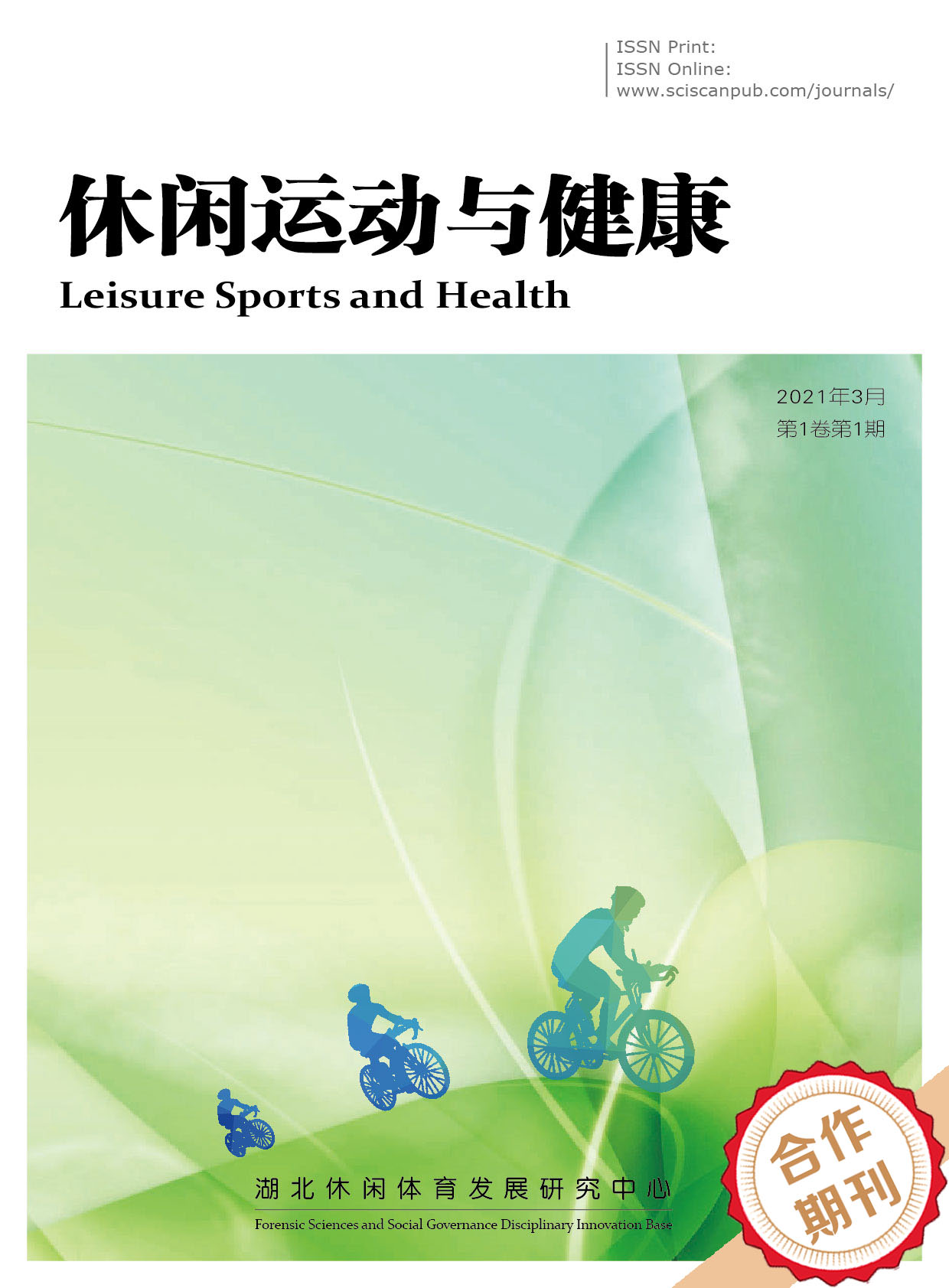Leisure Sports and Health
马术干预对孤独症儿童身心健康影响的个案研究
Case Study of the Impact of an Equestrian Intervention on Physical and Mental Health in Children with Autism
- Authors: 舒华平 易念 伊超凡 史海龙
-
Information:
湖北大学体育学院,武汉
-
Keywords:
Equestrian; Autism; Physical and mental health马术; 孤独症; 身心健康
- Abstract: In order to explore the impact of equestrian on the physical and mental health of autistic children, two children with mild or moderate autism were selected from a public special school in Wuhan for 12 weeks (divided into 3 stages), twice a week for 45-60 minutes. The study used a single-subject experimental design to measure and evaluate the subject physical function and behavioral mental scales both before the intervention and at each session. After 12 weeks of equestrian intervention training, the two subjects showed the following positive effects:improved cardiopulmonary function, physical coordination, balance ability, flexibility, and postural control, emotional stability, enhanced self-care ability, and improved social communication and cognitive ability. 为了探究马术对孤独症儿童身心健康的影响,在武汉市某公立特殊学校选取了2名轻中度孤独症儿童,对其进行为期12周(分为3个阶段),每周2次,每次45~60分钟的马术干预训练。研究采用单被试实验设计,在干预前和每个阶段均对受试者身体机能和行为心理量表进行测量评估。经过12周的马术干预训练,2名受试者出现了以下积极效果:提高了心肺功能,身体协调性、平衡能力、柔韧以及姿势控制等有进步,情绪变得稳定,生活自理能力增强,社会交往与认知能力也有一定改善。
- DOI: https://doi.org/10.35534/lsh.0204007
- Cite: 舒华平,易念,伊超凡,等.马术干预对孤独症儿童身心健康影响的个案研究[J].休闲运动与健康,2022,2(4):35-41.
孤独症(也称自闭症)是一种起病于儿童发育早期的广泛性神经发育障碍,以社交沟通障碍、兴趣狭隘、行为重复刻板为主要核心症状,严重影响儿童社会功能和生活质量。我国儿童孤独症患病率约为7‰,严重危害儿童的身心健康和家庭幸福[1]。孤独症发病机制目前尚未明确,且无药可医,虽然一般都会有专业医生给孤独症患者出具药物治疗,但是药物无法对孤独症核心症状起实质性作用,只能起到治疗其他并发症的辅助作用,且大多数药物都具有一定的副作用如导致患儿出现自残等[2]。为了减少症状对儿童功能的影响,越来越多的研究者采用各种治疗手段去干预孤独症儿童,并且对患有孤独症的幼儿进行早期强化干预行为是目前认为最有效地应对孤独症的办法[3]。目前在研究和应用较多的传统方法主要有:①行为分析疗法(applied behavior analysis,ABA),早在1987年Lovaas报道的对19例孤独症儿童采用ABA疗法加强化干预,每周干预40 h,干预2年,结果有9例基本恢复正常,引起了很大的轰动,后来很多学者重复了Lovaas的干预方案,也都获得了比较好的效果[4];②感觉统合训练,感觉统合训练根据患儿的具体性格特点,借助按摩球、平衡触觉板、晃动独木桥、羊角球、跳床、平衡木或滑板等器材,开展具有个性化的训练方式,能够使患儿的情绪状态和日常行为更加稳定[5]。
运动干预作为在慢性病的预防和康复阶段均有应用的一种干预方式,也被广泛学者应用于孤独症儿童的干预中,研究表明运动干预不仅可以提高孤独症儿童的身体素质,还对孤独症儿童的重复刻板行为、学业表现和社会交往能力有改善作用[6]。动物辅助干预(animal-assisted intervention,AAI)在治疗孤独症也有积极效果[7]。马术干预是动物辅助干预和运动干预的有机结合,既具有动物辅助干预的功能,也具备运动干预的效果,值得在孤独症患者中推广使用应用,并且马术干预在瑞典等欧洲国家已是政府基本医疗保障覆盖的治疗项目[8]。因此本文通过个案研究,来探究马术干预对孤独症儿童的身心健康的效果。
1 研究对象与方法
1.1 研究对象
本研究的受试者筛选标准为:①经有资质的医院的专科医生确诊,有轻中度孤独症诊断书,具有基本的运动能力;②年龄6~14岁(性别不限);③近三个月内未接受过与孤独症相关的任何药物治疗;④半年内未接触过骑马运动;⑤不惧马,无毛发过敏史;⑥受试期间自愿配合,不介入影响马术干预效果的药物及其他治疗。基于以上标准,本研究共确定2名受试者参加实验,基本情况如下。
ZYL:男,12岁,能听懂并执行大部分简单的指令;可以在外力介入下模仿简单的动作和语言;喜欢重复说一些奇怪的字母数字;痛觉失调,如腿不小心撞伤出血了,会用手去拍打伤口,扯掉创可贴。
LZM:男,8 岁,能听懂并执行大部分简单的指令;可以在外力介入下模仿简单动作,语言模仿较少;喜欢重复说一些广告词和动画台词,但含糊不清;情绪问题较严重,不满足其需求时,会大声喊叫吵闹。
1.2 研究工具
1)孤独症儿童行为量表
本研究选择国内外应用最广泛的孤独症儿童行为量表(autism behavior checklist,ABC),该量表由学者Krug于1978年编制,1989年北京医科大学杨晓玲教授将其引进并进行了修订。该量表目前被国内外广泛应用于临床上孤独症儿童的筛查,对不同年龄、不同性别者使用无差异,信度、效度均良好[9,10]。ABC量表在填写时以“是”或“否”来判断57个孤独症常见的异常表现,总结归纳出感知觉(9项26分)、社会交往(12项38分)、躯体运动(12项38分)、语言表达(13项38分)、生活自理(11项38分)5个维度共178分,筛查分为58分,低于58分则考虑不是孤独症,高于58分即可能为孤独症,分值越高孤独症程度可能越严重。
2)测试内容及器材
肺活量:乃力NL-100高精度数显电子肺活量测试仪。柔韧性(坐位体前屈):坐位体前屈测试仪。协调性(15秒侧向跳):秒表、宽标志胶带。平衡能力(闭眼单脚站):秒表。
1.3 实验设计
本研究采用单被试实验法中的跨被试多探测实验设计。在干预前对2名受试者进行包括行为心理指标的量表评估和身体机能的各项指标测试作为基线期测试,并每隔4周进行一次各项指标测试,共进行4次测试。实验结束后对干预前、中、后的测试数据进行比较,观察马术干预对孤独症儿童身心健康的影响。
1)研究变量
本研究自变量为马术干预内容,包括热身活动,喂马,与马亲密接触,马术技能训练,马背体操,放松活动等。因变量为孤独症儿童的行为心理表现、协调、柔韧、平衡等身体机能。控制变量为在干预期间受试者不介入任何药物和其他影响马术干预效果的康复治疗。
2)干预内容
马术干预期为:2022年6月下旬—2022年9月中旬,为期12周,每周进行2次干预,单次干预时长为45~60 min,实验场地位于武汉市东方马城。选用体型矮小、性格温顺的国产Pony马(名为大白)作为干预工具。每次干预安排2名受试者,1匹马,1名教练,2名治疗师。干预内容包括热身、牵马、骑行与马上运动、喂马并与马接触以及拉伸,共5个主要环节。热身为涵盖身体各个主要运动环节的徒手操,骑行分为慢步骑行和快步打圈,期间会加入一些简单的马背体操,如仰卧马背、双手侧平举、双手前平举、双手摸头盔、脚踩马镫起立和坐姿俯身单手摸对侧脚等,拉伸为简单的大肌肉群静态拉伸。运动强度基本保持在中、低等强度,以有氧运动为主要运动方式。
2 研究结果与分析
2.1 马术干预对孤独症儿童行为心理的影响
1)干预前后孤独症儿童ABC量表评分变化与分析
表1显示,ZYL的ABC量表评分下降了13分,分别是感知觉维度减了1分、社会交往维度下降了4分、躯体运动维度下降了4分、语言表达维度下降了2分、生活自理维度下降了3分。ZYL在马术干预过程及日常生活中听指令能力提高,他在干预过程中也会主动说出“马在干什么”“怕”等语句。ZYL妈妈在引导其说话时更为容易,也更愿意配合。ZYL妈妈表示ZYL在进行马术干预训练之后,接触到的人和事变多了,相应其开口说话、回答问题的机会也变多了,在家里让其完成相应的热身操也能积极配合。
表 1 孤独症儿童干预前后ABC量表评分变化表
| 项目 | ZYL | LZM |
| 感知觉 | -1 | -3 |
| 社会交往 | -4 | -11 |
| 躯体运动 | -4 | -3 |
| 语言表达 | -2 | -4 |
| 生活自理 | -3 | -4 |
| 总分 | -13 | -25 |
LZM的ABC量表评分下降了25分,分别是感知觉维度减了3分、社会交往维度下降了11分、躯体运动维度下降了3分、语言表达维度下降了4分、生活自理维度下降了4分。LZM在马术干预过程中,刚开始因为要和ZYL轮换骑马时,会哭闹来表现其不愿意轮换的要求,需要教练和研究者不停安抚下才能继续进行。随着训练的深入,后面LZM的情绪稳定了很多。据LZM爷爷反馈,LZM在家里想要什么东西,跟他说等一下再给他,他也能够等一会儿了。并且在训练结束之后去地铁站的路上,因为天气炎热,LZM会主动与研究者分享太阳伞遮阳,还能与研究者进行简单的对话交流。其爷爷也反馈,进行马术干预训练之后LZM在语言交流方面进步非常明显。
2)马术干预孤独症儿童ABC量表评分变化机理
由图1可知,2名受试者的ABC量表评分都呈现下降趋势,通过ABC量表的多次评分的直观反映,以及受试者的主要抚养人和教练员的反馈,结合研究者在实验过程中对受试者行为表现的观察进行综合评估,能够从多方面共同说明马术干预对孤独症儿童主要心理行为症状的改善是有效果的。本研究两名受试者在行为心理方面的变化主要是:ZYL学习说话的能力提高,组织语言的能力也有所改善,情绪急躁减少,听指令变好,对自身的身体控制能力提高,生活自理能力变好;LZM情绪急躁变少,逐渐能够接受等待,听指令变好,用语言表达需要增多,开口表达欲望增强,在感兴趣的事物上注意力更为集中。

图 1 孤独症儿童 ABC 量表评分变化图
受试者出现以上变化的可能机理是:
①在骑马时,马可以提供平时体验不到的各种感觉刺激,促进大脑合成分泌内啡肽,让受试者感到放松和愉悦[8],受试者情绪变得稳定,减少了情绪急躁的表现。
②经过长时间的相处,受试者与马有了感情联系,在家里会热衷于随家长准备喂马的食物,这些就会增加与人接触交流的机会。
③马背的高度大约在1.3米,对于身高1.5~1.6米的受试者而言,想要骑在马背上就要集中注意力,克服恐惧感。骑马也是对受试者胆量锻炼的过程,提高了受试者的自信心和成就感,给受试者带来了全新的体验和感受。
④马术干预过程中,有许多手部的精细动作,如自己动手戴安全头盔、系上头盔的绳扣,用手捏着胡萝卜往马嘴里喂食,抓握缰绳等。这些练习会提高受试者完成手部精细动作的能力,进而可使受试者生活自理能力提高。
以上研究结果与石梦妮[11]、褚晓玲[12]、Gabriels等[13,14]、周奇敏等[15]等人的研究结果相似,马术干预改善孤独症儿童的主要心理行为有提高情绪稳定性、语言交流变多、生活自理能力提高、模仿能力加强。
2.2 马术干预对孤独症儿童身体机能的影响
1)干预前后孤独症儿童平衡能力的变化与分析
平衡能力是人体在静止或行动的过程中,能够协调身体维持自身稳定的能力,闭眼单脚站是一种简单且快捷的平衡能力测试方法,是通过测量人体在仅依靠大脑前庭器官的平衡感受器和全身肌肉的协调情况下,来维持身体重心稳定在单脚支撑面上的时间,反映平衡能力的强弱,保持的时间越长,平衡能力越好[16]。由于事先不清楚受试者的优势腿,本研究分别测试了受试者左腿支撑和右腿支撑的闭眼单脚站。
由表2可知,ZYL和LZM在右腿支撑时闭眼单脚站成绩都比左腿要好,表明ZYL和LZM的优势腿均为右腿。由图2和图3可知,ZYL和LZM左右两只腿支撑的闭眼单脚站成绩均逐渐提高,这表明马术干预可以改善孤独症儿童的平衡能力。
表 2 不同干预阶段孤独症儿童闭眼单脚站测试成绩
| ZYL | LZM | |||||||
| 0W | 4W | 8W | 12W | 0W | 4W | 8W | 12W | |
| 左腿支撑 | 3.37 | 6.28 | 8.27 | 9.32 | 2.86 | 3.57 | 4.38 | 4.77 |
| 右腿支撑 | 3.35 | 8.80 | 9.58 | 11.38 | 3.78 | 4.04 | 6.49 | 6.74 |

图 2 孤独症儿童左腿支撑闭眼单脚站成绩变化图

图 3 孤独症儿童右腿支撑闭眼单脚站成绩变化图
2)干预前后孤独症儿童柔韧性的变化与分析
坐位体前屈反映了受试者的身体柔韧性。在我国,早在国民体质监测系统和《国家学生体质健康标准》创设伊始,坐位体前屈便是测试指标之一,并一直沿用至今[17]。
由图4可知,ZYL和LZM的坐位体前屈成绩在逐渐提高,这表明马术干预可以改善自闭症儿童的柔韧性。

图 4 孤独症儿童坐位体前屈成绩变化图
3)干预前后孤独症儿童协调性的变化与分析
协调性作为运动能力中最基本的能力素质之一,是人体进行动作技术学习和运用的基础,15秒侧向跳是测量身体协调性的简便方法之一,通过计量15秒内侧向跳跃的有效次数反映受试者的协调能力,有效次数越多,表明协调能力越好[18]。
由图5可知,ZYL和LZM的15秒侧向跳成绩均呈现增高趋势,表明马术干预可以改善孤独症儿童的协调性。

图 5 孤独症儿童侧向跳成绩变化图
4)干预前后孤独症儿童心肺功能的变化与分析
《国家体质健康标准》规定了肺活量指标是学生义务教育阶段、高中阶段以及大学阶段体质测试的必测项目[19],肺活量可以直观反映被试的心肺功能水平,也可间接反映被试的生长发育水平。
由图6可知,ZYL和LZM的肺活量成绩均呈现上升趋势,表明马术运动能促进孤独症儿童肺活量的增大,促进孤独症儿童心肺功能的生长发育。

图 6 孤独症儿童肺活量成绩变化图
5)马术干预孤独症儿童身体机能的改善机理
马术运动在我国历史文化悠久深厚,马术既具备运动性的特征,是一种具有特定目标、特定规则的专项体育活动,包括稳定动作、位移动作和操控动作[8],也具备一般运动所不具有的人马互动的特征。马术能够改善受试者身体机能的机理可能是:
①马术干预是一种独特的干预手段,它可以同时锻炼和发展认知、感官和运动系统[20]。受试者在骑马过程中,能够跟随马的运动而运动,同时马的运动信息能够通过受试者下肢传至全身,给受试者输入并易化了类似正常步态与方向的全新运动模式,有助于受试者对自身身体的感知,促进受试者运动调节功能[8]。
②孤独症儿童的姿势控制系统发展较慢,导致他们会依赖外部支持,如在写作时要依赖桌子稳定身体姿势[21]。受试者在骑马过程中,需要在上下起伏的马背上保持自身平衡,上下马练习要求受试者不断转换身体重心,静态和动态的马背体操都有涉及平衡训练,这些训练和练习都有助于受试者身体姿势的控制和平衡能力的发展。随着受试者的躯体稳定性的改善,其远端控制也有可能得到改善,使上肢的粗大和精细运动应用更加自如。
③积极参与干预活动已被证明会改善孤独症儿童的适应性,并增强参与日常活动的意愿[22],使用马术运动作为干预方法,理论上也有类似影响。此外,孤独症儿童在目标导向的运动和模仿活动中,促进了他们与同伴一起进行活动的意愿。可以让马术干预期间获得的新技能,在其他日常活动中更好地应用[20]。
④在马术干预的热身环节以及放松环节,都会安排动态徒手操和静态拉伸练习,以及骑行时,有一些马背体操和行进间马背起坐练习,这些练习能够改善受试者上下肢的协调能力,提高柔韧性和平衡能力。
⑤马术干预作为运动干预的一种,持续12周,每周2次,每次45~60分钟,且以中低等强度有氧运动为主的马术运动,能够促进机体心肺功能的提高,表现为肺活量成绩的增长。
⑥小脑主要参与运动设计和运动控制,小脑异常可能是自闭症外显症状的一个重要因素[19],马术干预是一项需要学习运动技能、运动控制和社会参与的复杂活动,马术干预训练后受试者出现改善的原因可能与小脑功能提高有关。
以上结果与石梦妮等[11]、褚晓玲[12]、Bass等[23]、Holm等[24]等人的研究结果相似,马术运动具有较好的健身效果,能够促进孤独症儿童心肺功能的生长发育,提高平衡、柔韧和协调功能。
3 结论与展望
3.1 结论
1)马术干预对孤独症儿童的行为心理有改善效果,具体表现在孤独症儿童的情绪意燥情况减少、听从和理解指令能力提高、生活自理能力提高和社会交往能力有所改善。
2)马术干预对孤独症儿童的身体机能有改善效果,具体表现在孤独症儿童对自身身体姿势控制能力提高、心肺功能、平衡功能、柔韧素质、协调能力等均有一定的改善。
3.2 不足与展望
1)完善干预计划
本研究的干预计划虽由基本的马术训练基本内容构成,但仍有不足的是,没有根据孤独症儿童的基本情况来设计个性化干预处方。今后的研究可以着眼于孤独症儿童的核心症状设计干预方案,细化每次训练的内容,提高干预方案的科学性。
2)增大样本量
本研究只有2名受试者,马术干预的效果是否具有个体偶然性仍需要进一步的研究证实或证伪,因此需要增大样本量,设计随机对照实验来验证马术干预的效果。
3)适当增加和完善测试指标
本研究只选取了一种国内外孤独症行业应用最广泛的ABC量表,用来评估孤独症儿童的行为心理表现,该量表由多个维度组成,但仍然无法囊括孤独症儿童所有异常表现。因此,今后的研究可以增加一些其他可靠量表来评估孤独症儿童的行为心理变现的变化。另外如今脑科学发展迅速,在有条件的情况下,今后的研究可以结合脑科学、神经化学等学科知识来进一步验证马术干预孤独症儿童的机制。
4)选择更加合适的时期进行干预
本研究受新冠肺炎影响,干预实验时间推迟到2022年6月~9月,这段时间是一年中最热的阶段,天气炎热可能会导致孤独症儿童情绪不稳,难以高质量地完成干预内容。因此,今后的研究在时间安排上可以在条件允许下选择天气更加舒适的春天或秋天进行。
参考文献
[1] 中华人民共和国国家卫生健康委员会.妇幼健康司[EB/OL].[2022-09-20].http://www.nhc.gov.cn/fys/s3585/202209/17deed3b6ecb417aaa947d108bf5ab3a.shtml.
[2] 段云峰,吴晓丽,金锋.自闭症的病因和治疗方法研究进展[J].中国科学(生命科学),2015,45(9):820-844.
[3] Rogers S J,Vismara L A.Evidence-based comprehensive treatments for early autism[J].Journal of Clinical Child & Adolescent Psychology,2008,37(1):8-38.
[4] 张颖,徐秀.孤独症的早期干预[J].临床儿科杂志,2010,28(8):741-743.
[5] 黄艺敏.感觉统合训练对自闭症患儿康复效果的影响[J].实用中西医结合临床,2019,19(10):107-108.
[6] 徐雷.自闭症谱系障碍个体运动干预研究进展[J].中国体育科技,2017,53(6):117-126,141.
[7] 杨鹏羽,王佳琳,刘月,等.动物辅助干预研究进展的可视化分析[J].中国康复理论与实践,2022,28(11):1325-1333.
[8] 高延,洪琦,罗小杏,等.马术辅助干预孤独症谱系障碍儿童的疗效及应用研究[J].中国妇幼健康研究,2018,29(7):837-841.
[9] 陶国泰.儿童少年精神医学(第1版)[M].南京:江苏科学技术出社,1999:123-125.
[10] 李雪荣.现代儿童精神医学[M].长沙:湖南科学技术出版社,1994:155.
[11] 石梦妮,李树屏,陶江.马术运动干预特殊儿童(自闭症、脑瘫)跟踪研究[C]//中国体育科学学会.第十一届全国体育科学大会论文摘要汇编,2019:3823-3824.
[12] 褚晓玲.马术运动对自闭症儿童身心的干预效果研究[D].武汉:湖北大学,2021.
[13] Gabriels R L,Pan Z,Dechant B,et al.Randomized controlled trial of therapeutic horseback riding in children and adolescents with autism spectrum disorder[J].Journal of the American academy of Child & Adolescent Psychiatry,2015,54(7):541-549.
[14] Gabriels R L,Pan Z,Guérin N A,et al.Long-term effect of therapeutic horseback riding in youth with autism spectrum disorder:a randomized trial[J].Frontiers in Veterinary Science,2018(5):156.
[15] 周奇敏,朱宇翔,洪琦.马辅助干预孤独症谱系障碍儿童的研究进展[J].中国儿童保健杂志,2019,27(8):861-863,872.
[16] 袁金风,张秋霞,陆阿明.闭眼单脚站立方法在体质测试中的应用[J].中国组织工程研究,2013,17(33):6049-6054.
[17] 陈庆果,杨丽君,郑雪芹,等.体质健康视域下柔韧素质的健康效益与锻炼方式再审视[J].上海体育学院学报,2022,46(6):31-40.
[18] 石鑫.节拍训练对8~12岁自由泳运动员协调能力的影响研究[D].上海体育学院,2021.
[19] 黄昊.“HIIT MUSIC训练法”对普通高校女生体测肺活量成绩的影响[D].上海:上海体育学院,2020.
[20] Ajzenman H F,Standeven J W,Shurtleff T L.Effect of hippotherapy on motor control,adaptive behaviors,and participation in children with autism spectrum disorder:A pilot study[J].The American Journal of Occupational Therapy,2013,67(6):653-663.
[21] Pehoski C,Henderson A,Tickle-Degnen L.In-hand manipulation in young children:rotation of an object in the fingers[J].The American Journal of Occupational Therapy,1997,51(7):544-552.
[22] Brown N B,Dunn W.Relationship between context and sensory processing in children with autism[J].The American Journal of Occupational Therapy,2010,64(3):474-483.
[23] Bass M M,Duchowny C A,Llabre M M.The effect of therapeutic horseback riding on social functioning in children with autism[J].Journal of autism and developmental disorders,2009,39(9):1261-1267.
[24] Holm M B,Baird J M,Kim Y J,et al.Therapeutic horseback riding outcomes of parent-identified goals for children with autism spectrum disorder:An ABA’ multiple case design examining dosing and generalization to the home and community[J].Journal of autism and developmental disorders,2014,44(4):937-947.
















